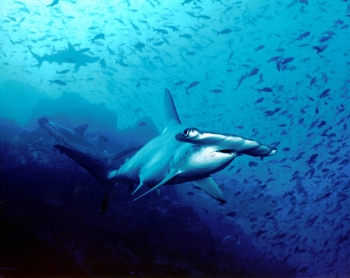Underwater Safari: Diving With Sharks

For some people, swimming in shark-infested waters is just what they're after. Adrenaline junkies and admirers of dangerous megafauna can now experience the ocean's apex predators up close, in their natural habitat, thanks to a number of shark diving trips that are being offered around the planet. Shark spotting has become an ultimate dive experience, and shark diving spots have become destinations that are on top of the bucket list for both the experienced and beginner divers.
Most of these spots are not the place for inexperienced divers - and not only because the sharks can be dangerous. Diving there can be a challenge. Best shark diving spots tend to be in the waters with strong currents, because the flow of water brings with it sharks' prey: the smaller fish that feed on plankton.
The great white is the first to come to mind when we think about sharks, but this species is best viewed using shark cages, to keep the divers safe. If you want to dive with the great white sharks, Neptune Islands in South Australia, Isla Guadalupe in Mexico, South Africa and New Zealand are the place to go. The favorite region for less dangerous sharks, such as tiger sharks, bull sharks, and oceanic white-tips, is Bahamas.
Three islands in the East Pacific, Cocos Island, Galapagos and Malpelo, make the "Hammerhead Triangle" - the best place in the world to dive with the hammerhead sharks. Hammerhead sharks are aggressive predators, but do not actively seek human prey. They are however known to attack when provoked.
Costa Rican Cocos Island - inspiration for Crichton's "Jurassic Park" - is a remote, uninhabited volcanic island in the middle of the Pacific. In 1994, Jacques Cousteau described the island's Marine Park as "the most beautiful in the world". Cocos Island is a UNESCO World Heritage Site - and is also known as the island of the sharks!
Deep waters surrounding the island are cold, with strong currents, and not a place for the beginner diver. They are however the best place in the world to watch hammerhead sharks. During the summer months, they school in hundreds here. Large numbers of white-tip sharks are gathering at night to hunt for sleeping fish.
Sharks have been around for millions of years, and are in a way the pinnacle of marine life evolution. They play a vital role in the ecosystem of the oceans. Sharks have only one natural predator: man. Many populations of sharks all over the world are seriously endangered because of the shark fin trade. The global shark tourism is currently a five hundred million dollar industry, and growing. Hopefully, more people around the world will start to realize that sharks generate more money alive than dead.
